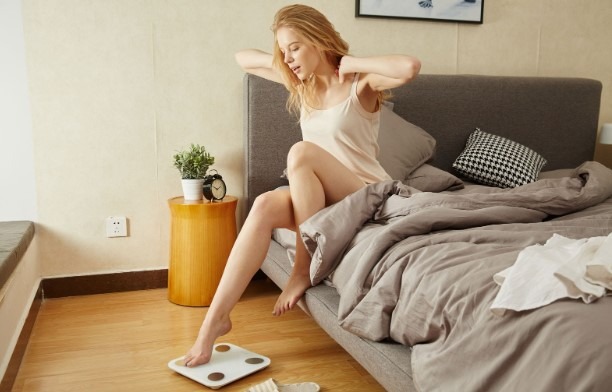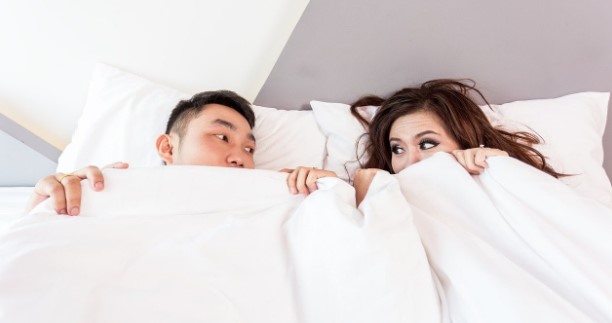Sleep is essential to wellbeing and good health. Poor sleep patterns affect people’s lives in many unpleasant ways. The Buteyko breathing method offers a natural way of learning to control your breathing during sleep and improve your sleeping patterns. It will help you reduce snoring, sleep apnea symptoms, insomnia, nightmares, and disturbing, vivid dreams that leave you feeling tired during the daytime.
Sleeping and breathing are tied together, and it’s impossible to have a restful, refreshing good night’s sleep if you don’t have healthy breathing patterns. In this article, we will discuss the ways poor breathing during sleep can affect your health, and some useful tips for improving your sleep.

Effects of Hyperventilation
As our metabolism goes through changes, our breathing patterns change. We don’t breathe the same way when we exercise, have lunch, or sleep. When we breathe during running or exercise, our metabolism works faster, and our breathing is heavier and louder. It also feels more forceful.
On the other hand, when we sleep, our metabolism slows down, and our breathing gets quiet and calm. People who snore breathe far heavier than what is normal during sleeping. Snoring is much more similar to your breathing patterns during exercise than to the patterns that should be during sleep. In conclusion, snoring happens when you breathe much more air than you should while you’re sleeping, and the medical term for it is hyperventilation.
You may not be aware of hyperventilation as such, but you may recognize some of its symptoms:
- Waking up multiple times overnight
- Nightmares and exhausting vivid dreams
- Waking up feeling tired
- Constant daytime fatigue
- Blocked nose upon waking
- Snoring
- Night sweats
- Pauses in breathing during sleep, or sleep apnea
- Waking up in the middle of the night to urinate instead of sleeping with no pause all night long.
Breathing heavily or snoring during sleep significantly affects the way you feel in the morning. You need to address the root of your problem to stop breathing forcefully during your sleep. When you start breathing correctly, your whole metabolism will rest during sleep, and you will wake up refreshed and fully energized. The Buteyko breathing method helps you train your body to breathe properly throughout the day, and even during sleep in a completely natural way that stops hyperventilation.

Important Tips For Getting Better Sleep:
If you have problems with daytime fatigue, and you would like to work on improving your sleep patterns, a Buteyko breathing technique may be able to help you regain your energy.
In addition to Buteyko breathing, there are several useful tips to follow:
- Forget about going to bed at the same time every night. Instead, go to sleep when you feel tired.
- When you wake up in the morning feeling fresh and energized, get out of bed, and start your day. Don’t stay in bed and continue to doze.
- Don’t eat heavy meals at least an hour before you go to sleep
- Try to relax before going to bed. Your breathing needs to be slow and not too forceful for carbon dioxide pressure to climb slightly within the body and give you a good night’s rest.
- Try to always breathe through the nose. Although this is a Buteyko breathing technique, you should constantly try to breathe through the nose, not just during breathing exercises.
- Especially aim to constantly breathe through your nose while you’re preparing for your sleep. That way, you will become more attuned with nasal breathing. Before you fall asleep, check your nostrils for the one that’s blocked more. Turn around and lay on that side as you fall asleep. After a while, the breathing nostril will get tired and you will automatically roll over to switch to using the other nostril. It will happen many times during the night and by doing it, you place a lot less stress and pressure on your hips, joints, and shoulders.
- Try to keep your torso relaxed and long before dozing off. Don’t curl up with your stomach bent and your chin on your chest.
- Try to never sleep on your back. It’s the most uncomfortable and unnatural way of sleeping.
Bonus Tips
- In case you have to sleep on your back, make sure your head is slightly higher than your feet. Don’t take a huge pillow or put another one on top of your regular pillow because this will only make you curl your neck and make your chin close to your chest. Instead, put a big pillow under your mattress, so it lifts your entire torso, shoulders, and head.
- Make sure the bedroom isn’t too hot. Your body needs to cool down during sleep, so you should use a cover that warms you up, but doesn’t make you feel super-hot.
- If you have severe insomnia, try not to stress too much about it. Not much happens during sleep that doesn’t happen if you lay all night calmly without falling asleep. Having a full-body rest is extremely important and almost as good as sleeping. The part that’s hurting you is the one where you get frustrated because you can’t fall asleep. Instead of stressing out because of your insomnia, try to lay down, be calm, and allow your body to rest.
I’m a 20-something stay-at-home mother and wife. I have an amazing husband, a beautiful daughter, two loving dogs, and a lazy cat. I wouldn’t change my life for anything! I love to read, listen to music, cook and blog!

Speak Your Mind